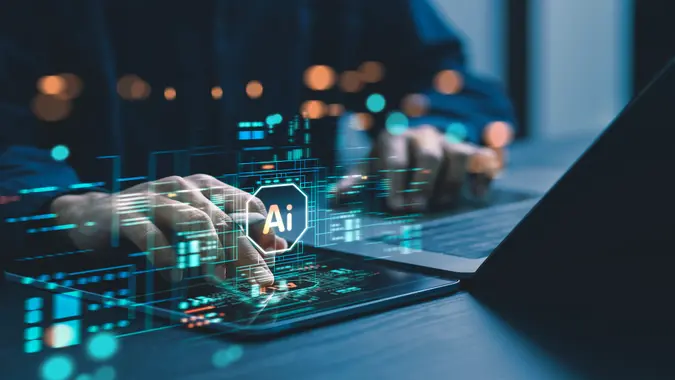See Why the Godfather of AI Says It Will Make ‘Most People Poorer’

Commitment to Our Readers
GOBankingRates' editorial team is committed to bringing you unbiased reviews and information. We use data-driven methodologies to evaluate financial products and services - our reviews and ratings are not influenced by advertisers. You can read more about our editorial guidelines and our products and services review methodology.

20 Years
Helping You Live Richer

Reviewed
by Experts

Trusted by
Millions of Readers
Geoffrey Hinton didn’t mince words when discussing the impact of artificial intelligence (AI) on the economy. The Nobel Prize-winning computer scientist, known as the “godfather of AI,” warned that artificial intelligence will create “massive unemployment” while making “most people poorer.”
His prediction isn’t about technology failing. Instead, it’s about how the economic system will distribute AI’s benefits.
The Stark Economic Reality
“What’s actually going to happen is rich people are going to use AI to replace workers,” Hinton explained in a Financial Times interview. “It’s going to create massive unemployment and a huge rise in profits. It will make a few people much richer and most people poorer.”
Hinton placed the blame squarely on economic structures rather than the technology itself. He said it’s not AI’s fault, it’s the fault of our “capitalist system.”
This is different from most AI discussions that focus on whether the technology will work. Hinton’s talking about something else entirely: who gets to keep all the money when AI makes everything cheaper and faster to produce.
The Employment Shift Ahead
Hinton’s warnings about job losses haven’t happened yet, for the most part, but he thinks they’re coming as AI gets better and cheaper to use.
He’s worried about which workers will get hit hardest and whether ordinary people will see any benefits from AI making companies more productive. Right now, when companies use AI to do work faster, the savings mostly go to shareholders and executives rather than the employees who got replaced.
Which Jobs Face the Greatest Risk
Hinton has opinions on which jobs and careers will disappear first. “Jobs that perform mundane tasks will be taken over by AI, while sparing some jobs that require a high level of skill,” he said.
This creates a split job market. High-skill positions stay relatively safe while routine work vanishes. The tricky part is the middle; the jobs that need some skill but could potentially be automated.
Healthcare is one big exception. Hinton thinks this area could actually create more jobs instead of eliminating them because people always want more healthcare when they can afford it.
“If you could make doctors five times as efficient, we could all have five times as much healthcare for the same price,” he explained. “There’s almost no limit to how much healthcare people can absorb — patients always want more healthcare if there’s no cost to it.”
Why Universal Basic Income Won’t Fix It
When people ask about solutions to AI-driven job loss, Hinton has been skeptical about universal basic income (UBI) proposals that some AI leaders (including Sam Altman) promote. Altman has suggested UBI as a way to help workers displaced by AI, but Hinton argues that while UBI may provide financial relief, it fails to address deeper issues like human dignity and finding meaning in work. In other words, just handing out money won’t solve the bigger social problems created when millions of people can’t find jobs.
His criticism gets at something deeper than economics. What happens to people’s sense of purpose and identity when traditional work disappears for huge chunks of the population?
The Concentration of AI Benefits
Hinton’s analysis shows how AI benefits will pile up among people who already have money. Companies and individuals with cash to invest in AI technology will capture most of the productivity gains, while workers become less valuable.
This is different from past technological changes. When factories replaced farms, new types of jobs appeared even though old ones disappeared. AI might replace human capabilities across the board without creating equivalent job opportunities elsewhere.
Beyond Economic Predictions
Hinton worries about more than just jobs. He estimates a 10%-20% chance that AI could threaten human survival once it develops superintelligence.
These existential risks break down into two categories: dangers from the technology itself and what happens when bad actors get control of advanced AI systems. Both scenarios involve small groups gaining enormous power over everyone else.
“We don’t know what is going to happen, we have no idea, and people who tell you what is going to happen are just being silly,” Hinton said. “We are at a point in history where something amazing is happening, and it may be amazingly good, and it may be amazingly bad.”
The Bigger Picture
Hinton’s warnings about AI making most people poorer connect to bigger concerns about technology and inequality. Perhaps unsurprisingly, the benefits of AI won’t automatically spread evenly across society.
Instead, our current economic system will likely funnel AI gains toward people who already own capital and resources. Workers face job losses without guarantees of finding equivalent (or even decent) opportunities in new areas.
 Written by
Written by  Edited by
Edited by 

























